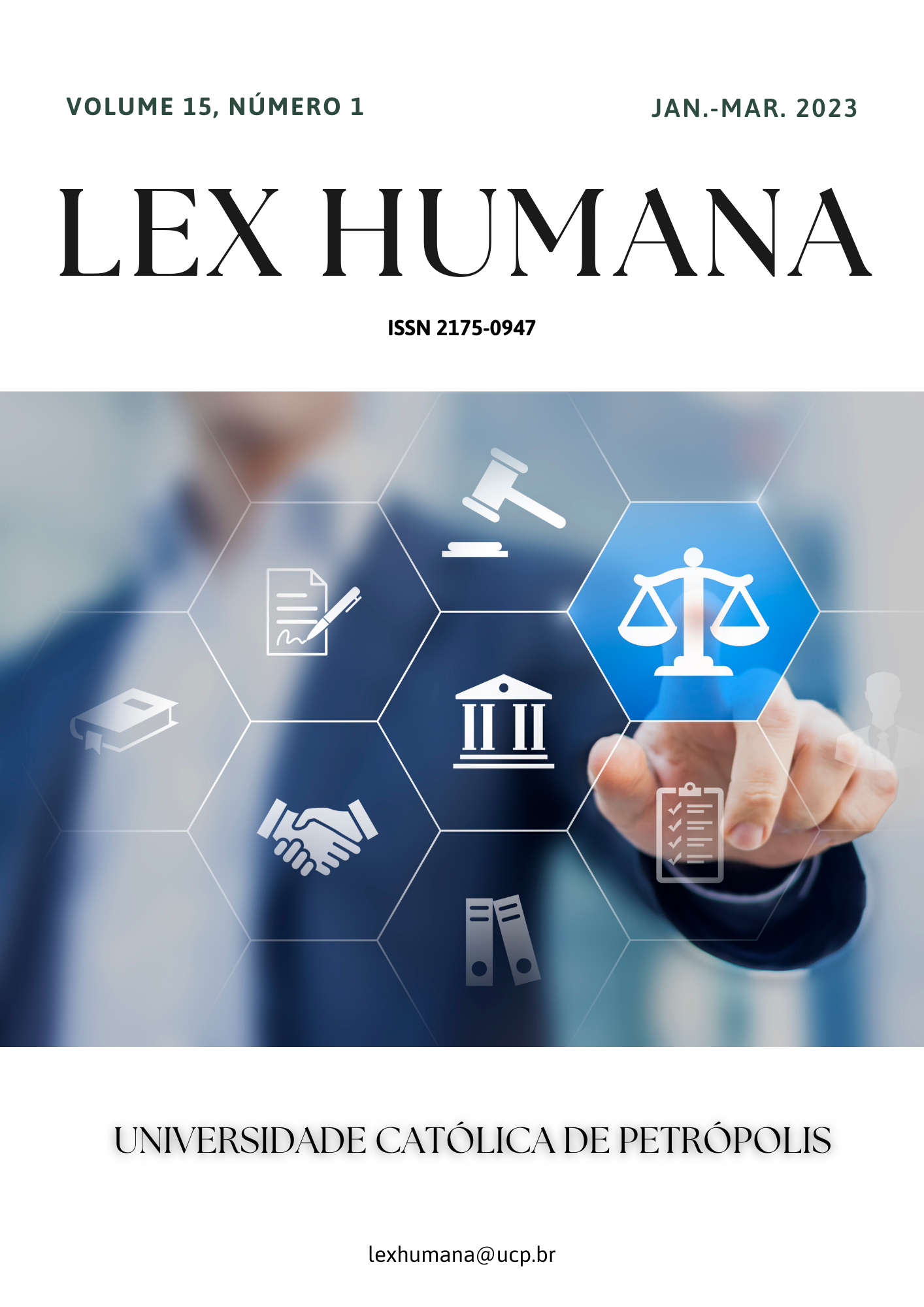Resumo
Uma pessoa que cometeu um delito deve ser levada à responsabilidade legal na medida de sua culpa. O estabelecimento da culpa de uma pessoa deve ser feito através da coleta de provas, sendo uma das formas de conduzir ações investigativas (busca). Durante uma investigação preliminar, a ação investigativa (busca) mais difundida é um interrogatório, que, de acordo com a legislação processual penal atual da Ucrânia, também pode ser conduzido por videoconferência. Este tipo de interrogatório também está previsto no nível legislativo de outros países estrangeiros e tem suas próprias características. Nesta base, em retrospectiva histórica, os autores realizaram uma análise do desenvolvimento do interrogatório via videoconferência, analisaram a experiência estrangeira de regulamentação legislativa do interrogatório via videoconferência, levando em conta o que foi concluído sobre a necessidade de melhorar a regulamentação legal desta ação investigativa (busca).
Referências
Bonner, O. T. (2011). Scientific and technical progress and development of Russian procedural legislation and judicial practice. Law of Ukraine, 10, 45–62.
Convention on Mutual Assistance in Criminal Matters between the member states of the European Union (29.05.2000). URL: https://zakon.rada.gov.ua/laws/show/994_238#Text.
Criminal Code Act 1995. Reprinted in the UK by HMSO. London, 1995. 87 p.
Criminal Justice Act 1988. Published by HMSO. London, 1989. 67 p.
Criminal Procedure Code of the Republic of Kazakhstan: Law of the Republic of Kazakhstan dated 04.07.2014 № 231-V ЗРК.
Hlobenko, H. I. (2021). Information and telecommunication system of pre-trial investigation: international experience and ways of implementation. Bulletin of Kharkiv National University of Internal Affairs, 95(4), 188-198. https://doi.org/10.32631/v.2021.4.16
Kasapoglu, S. O. (2019). Realization of the standards of criminal procedural law [Thesis for the degree of Doctor of Law]. Taras Shevchenko National University of Kyiv, the Ministry of Education and Science of Ukraine. Kyiv.
Khoma, I. (2018). Problems and advantages of conducting investigative (search) actions via videoconference. Bulletin of the Prosecutor's Office, 1, 34–36.
Knyzhenko, S. O., Matiushkova T. P. (2015). Legal, organizational and tactical foundations of remote pre-trial investigation. Bulletin of the exchange of work experience of the Ministry of Internal Affairs of Ukraine, 201, 116–125.
Koniushenko, Ya. Yu. (2021). Conceptual Framework of Legal Regulation of the Institute of Investigative (Search) Activities in Criminal Procedure of Ukraine [A thesis for a Doctor’s of Law degree]. Kharkiv National University of Internal Affairs, Kharkiv.
Litkevych, D. O. (2020). Theoretical and legal bases of using the achievements of scientific and technical progress in the criminal procedural form: thesis of a Candidate of Legal Sciences: 12.00.09. Kharkiv.
Mykhailenko, V.V. (2019). Implementation of the principle of rule of law in criminal proceedings [A dissertation for receiving an academic degree of the candidate of juridical sciences – Law]. National Academy of Internal Affairs, Kyiv.
Mykhalchuk, T. V. (2013). Peculiarities of carrying out separate investigative (search) actions in the mode of video conference. Criminalistics and Forensics, 58(1), 138–144.
Pavlova, N. V. (2013). Problems and prospects of distance proceedings. Scientific Bulletin of the Dnipropetrovsk State University of Internal Affairs, 2, 477–484.
Shulga, N. V. (2019). Conducting procedural actions in the mode of videoconference in criminal proceedings [Thesis for a Candidate Degree in Law. National Academy of Internal Affairs]. Kyiv,
Shyngarov, D. O. (2017). The ensuring of rights and legal interests of the persons in the process of interrogation during pre-trial investigation [A Thesis for a scientific degree of Candidate of Juridical Science]. Yaroslav Mudryi National Law University, Ministry of Education and Science of Ukraine. Kharkiv.
Sokyran, M. F. (2005). The question of the use of sound and video recording in the field of evidence in criminal cases. Special equipment in law enforcement activities: materials of the International Scientific and Practical Conference. Part 2. Kyiv: National Academy of Internal Affairs (pp. 225–227).
Stolitnii, A. V. (2017). Improvement of the electronic segment of criminal proceedings. Law and Society, 2(2), 187–191.
Yukhno, O. O., Ablamskyi, S. Ye., Bondarenko, O. O. and others. (2017). Methodological recommendations regarding the peculiarities of interrogation, identification in the mode of video conference during pre-trial investigation. Legislative provision of law enforcement activities: a study guide / ed. V.V. Sokurenko. Kharkiv: Stylna Typography (pp. 327–354).
Law of Ukraine (12.23.1993) No. 3782-XII. On ensuring the safety of persons participating in criminal proceedings. Vidomosti of the Verkhovna Rada of Ukraine.
Commission Recommendation 94/820/EC of 19 October 1994 relating to the legal aspects of electronic data interchange. Official Journal of the European Communities, 1994. L. 338. P. 0098–0117.
Protocol of the Council of Europe (08.11.2001). Second Additional Protocol to the European Convention on Mutual Assistance in Criminal Matters. URL: https://zakon.rada.gov.ua/laws/show/994_518.
Law of Ukraine (16.06.2011) No. 3529-VI. On making changes to some legislative acts of Ukraine in connection with the ratification of the Second Additional Protocol to the European Convention on Mutual Assistance in Criminal Matters. Vidomosti of the Verkhovna Rada of Ukraine.
Order of the State Judicial Administration (15.11.2012) No. 155. On the approval of the Instructions on the procedure for working with technical means of video recording of the course and results of procedural actions conducted via videoconference during a court session (criminal proceedings). URL: http://dsa.court.gov.ua/dsa/14/N1552012/
Order of the Cabinet of Ministers of Ukraine (15.05.2013) No. 386-р. Information society development strategy in Ukraine. URL: http://zakon4.rada.gov.ua/laws/show/ 386-2013%D1%80.
Criminal Procedure Code of Estonia: Law of Estonia dated 12.02.2003 № RT I 2003, 27, 166. URL: http://jus.ee/download-files/1/10/46/-/

Este trabalho está licenciado sob uma licença Creative Commons Attribution-NonCommercial-NoDerivatives 4.0 International License.
Copyright (c) 2023 Lex Humana (ISSN 2175-0947)

